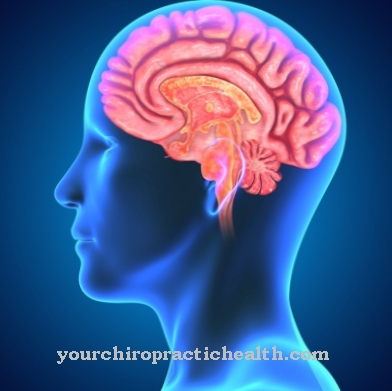A so-called pinched nerve can take different forms. The backgrounds from which a pinched nerve can result are just as diverse.
What is a pinched nerve?

For many people, a pinched nerve is particularly evident in the shoulder, back or neck area. The term pinched nerve is used colloquially, but also by medical professionals, for various complaints:
These include nerve irritation or irritation of adjacent muscles as well as inflammatory processes of the nerves. A pinched nerve in the shoulder, neck and back area is usually accompanied by very severe back pain.
Typically, the pain associated with a pinched nerve is stabbing or burning; in addition, such pain can be accompanied by numbness or profuse sweating (these symptoms can in some cases occur without accompanying pain). According to estimates, a pinched nerve appears on average in every third resident in the German population in the course of their life.
causes
A pinched nerve can have several causes; In most cases, a pinched nerve is the result of a long-term process resulting from poor posture or unbalanced loads. Such bad postures or one-sided stresses can be the result of long years of overhead work (as is the case with painters and varnishers) or years of work at the PC.
A pinched nerve can also be caused by carrying or improperly lifting heavy loads; And a pinched nerve can also follow unfavorable movement sequences during sport.
A pinched nerve can also be caused by strains, tension or misalignments that are assumed while sleeping. And finally, injuries such as whiplash or fractures (broken bones), as well as signs of wear or dysfunction of the spine, can be followed by a pinched nerve.
You can find your medication here
➔ Medicines for back painDiseases with this symptom
- Whiplash
- Broken nose
- Metacarpal bone fracture
- Skull base fracture
- Outer ankle fracture
- Radius fracture (broken spoke)
- Broken elbow
- Broken finger
- Ankle fracture
- Jones fracture
- Femoral neck fracture
- Cervical spine fracture
- Broken jaw
- Tibial head fracture
- Humerus head fracture
Typical symptoms & signs
- severe pain in the neck and throat
- severe back pain
- Tension of the back muscles
- Reflex weakening
- Chest pain
- a headache
- Motion stiffness
Diagnosis & course
The pain and discomfort (among other things, these can be restricted mobility) that a pinched nerve brings with it, set in suddenly in most cases. The nature and occurrence of this pain can initially lead to a suspected diagnosis.
Whether a pinched nerve is present can then be checked, for example, by measuring the nerve conduction velocity; this enables a statement to be made about a functional restriction of the nerve. So-called imaging methods, such as sonography or computed tomography, for example, can show a deformation of a nerve that a pinched nerve can have.
The course that a pinched nerve takes differs individually, among other things, according to the cause and the efficiency of a therapy. The involvement of the person concerned in a treatment usually has a positive effect.
Complications
If a nerve is pinched, serious complications will occur in many cases. There is almost always severe pain and numbness in the affected area of the body, accompanied by motor restrictions and abnormal sensations. If sensitive nerves are affected, there is an unpleasant tingling sensation in the entire supply area around the pinched nerve.
This must be treated promptly, otherwise the restrictions lead to muscle wasting, unnatural movement sequences and other complications. Later on, the symptoms spread to other parts of the body and the symptoms increase. If the pinched nerve occurs as a result of a metabolic disease, such as swelling of the tendon sheaths during pregnancy and during the menopause, the complications can differ significantly. It is not uncommon for complications to occur as a result of a surgical procedure.
If the pinched nerve is not completely freed, bleeding, excessive scarring or wound infection of the nerves can occur. Injuries to neighboring nerves, mostly caused by the procedure itself, are also a risk factor. After the operation, numbness may occur in the area around the freed nerve, which should, however, subside after a few hours to days. Complications such as muscle wasting and other restrictions on the affected parts of the body do not always recede completely, even after an operation.
When should you go to the doctor?
In the case of disorders or even pain, a medical layperson does not always know the cause. It is a mystery to him where the numbness in the arm or the pulling in the back comes from. Is it the sport? Has he spent too much gardening the other day? Many people do not think about the real reason - a planned nerve - when they experience such complaints. Often they first wait to see whether the discomfort disappears by itself. If this doesn't happen, most of them go to the doctor, often after a few days.
It is correct to consult a doctor as soon as possible in the event of unclear physical abnormal sensations such as pain, numbness, tingling, pulling, but also, for example, inexplicable sweating, if the symptoms do not subside within a few days. There may be a pinched nerve behind these symptoms. Waiting too long to see a doctor can cause irreparable damage to the pinched nerve. The family doctor is the ideal first point of contact.
In his anamnesis, he will include a pinched nerve as a possible cause in the diagnosis. If there is justified suspicion, the family doctor will arrange a referral to the neurologist and possibly also to the orthopedic surgeon. When in doubt, it is always better to see a doctor. For him there are no "too intrusive" patients.
Doctors & therapists in your area
Treatment & Therapy
If there is a suspicion that a person has a pinched nerve, it is often advisable to consult a doctor who can examine this suspicion and advise the patient on an individually suitable therapy.
In the event of sudden onset of pain caused by a pinched nerve, the person concerned can first take a few immediate measures: It can be helpful to breathe in slowly and deeply and initially remain in the position in which the pain occurred for a few minutes.
A pinched nerve can then be medically treated in various ways: For example, drug therapy can include pain-relieving or anti-inflammatory agents. Physiotherapeutically, a pinched nerve can be treated in parallel with measures such as massages, gymnastic exercises or heat applications. In severe cases, a pinched nerve can be treated surgically.
A therapy can be supported by the person affected by various measures: If there is a pinched nerve, a patient can avoid heavy lifting, observe the care recommended by the doctor and, if possible, prevent too fast and sudden movements.
Outlook & forecast
A pinched nerve usually loosens on its own. If the complaints are treated promptly and adequately, there is a prospect of a quick recovery. Typical accompanying symptoms such as headache or chest pain can usually be relieved immediately through various measures.
However, if complications such as inflammation or further irritation of the pinched nerve occur during the recovery process, complete healing may take several weeks or months.
The prognosis also depends on which nerve is trapped. If it is the sciatic nerve, for example, a carpal tunnel syndrome can occur, which can usually only be remedied by surgical interventions and physiotherapy. If nerves are pinched in the cervical spine, temporary symptoms of paralysis and other complications can worsen the outlook; however, in general the prognosis is relatively good. Most of the time, those affected have completely recovered and have no long-term consequences to fear.
If the pinched nerve is not or only insufficiently treated, permanent incorrect posture can result and the symptoms worsen. In the long term, this also increases the risk of similar complaints. The final prognosis for a pinched nerve can only be made by the responsible doctor.
You can find your medication here
➔ Medicines for back painprevention
So that a pinched nerve can be prevented in advance, it is helpful, among other things, to avoid various risk factors; For example, a pinched nerve can be favored by incorrect postures, incorrect carrying of loads and a lack of physical exercise. A pinched nerve can be combated as a preventive measure by interrupting or changing monotonous postures (such as when working with a PC) at regular intervals.
You can do that yourself
Everyday and self-help measures for a pinched nerve consist of trying to alleviate the causes of the compressed nerve so that some pressure relief is achieved. Usually heat applications help on the affected area.
Heat, which penetrates the tissue from outside, loosens the muscles and the connective tissue. If successful, the heat treatment is rewarded with a decrease in the pain and a return of the feeling, because the compressed nerve usually regenerates very quickly as the compression decreases. The application of heat can be done with simple means such as hot water bottle or warming envelopes. Warmth patches, which are available in every pharmacy, can also provide warmth for hours.
In addition to and parallel to the heat treatments, non-stressful movement exercises are recommended. The movements support the dissolution of blockages and muscle hardening. A gentle posture and the complete avoidance of movements are usually counterproductive in these cases because the blockages do not dissolve. Active relaxation, meditation and breathing exercises, which help the parasympathetic nervous system to collect stress hormones from the sympathetic nervous system and to tune the metabolism for regeneration and growth, have a supportive effect. If the entrapment of the nerve has no organic cause, further measures consist of targeted massage aimed at releasing the palpable muscle blockages.













.jpg)

.jpg)
.jpg)











.jpg)